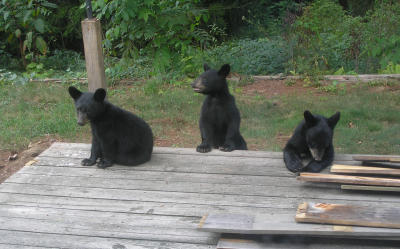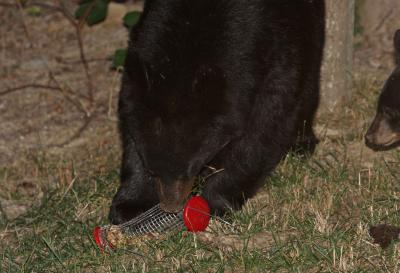Living in Bear Country!
Whether we like it or not, we are sharing our little part of nature with Black Bears. In order to prevent surprises and attacks we need to understand them, learn to live with them and respect that they have the right to live here too.
Black Bear Quick Facts:
If I call the N.C. Wildlife Resources Commission, will
someone trap and relocate a bear?
No-that would simply move the problem, rather than solve
it, and there are no remote places to move bears where they
won’t come into contact with people. The long-term solution
is to modify your habits to prevent problems or resolve an
existing conflict.
Do grizzly bears live in North Carolina?
No. North Carolina has black bears, which are 5-6 feet long
and 2-3 feet tall when on all fours. Females usually weigh
between 100 and 300 pounds; males can weigh between
200 and 500 pounds. A grizzly bear is larger, more aggressive and lives in the western United States.
What should I do if I see a bear?
Try to stay calm. Bears are usually wary of people unless humans feed or provoke them. Never feed, approach, surround
or corner the bear. If it changes its natural behavior because
of your presence, you are too close. Back away slowly and
once you are a safe distance away from the bear, make lots of
noise to frighten the bear away.
Will a black bear attack me?
Probably not. Black bears tend to be shy and non-aggressive
toward humans. There has not been an unprovoked bear
attack in North Carolina. However, if frequently fed, bears
may become dependent on human foods, which may lead
to increased interaction with people. Frequent human-bear
contact can cause bears to become more bold and visible
around humans
Where in North Carolina do bears live?
The vast majority of bears live in the mountain and coastal
regions of the state. However, black bears occasionally wander
into the Piedmont region. While they live in the woods, bears
occasionally wander into residential areas or towns in search of
food. If left alone and not fed, these wandering bears will eventually leave the area.
Live Responsibly with Black Bears. Be BearWise:
- Try our hot foods - Hot Pepper suet, cylinders, seed and dough. Bears have very large mucous membranes and the hot taste from capsaicin (active component of chili peppers) will turn them off on your food. But the birds can't taste it and it is good for them. Bears also have great memories, so they will remember that your "restaurant" is not good.
- Taking your bird feeders down before dusk and replacing them after dawn.
- Keep barbecues clean at all times.
- Do not leave bird or pet food outside.
- Keep your compost free from animal products or waste; use lime and turn regularly.
- Try not to put out more food than can be consumed by the birds in a single day.
- Do more ground and tray feeding as opposed to tube style feeders.
- If you have bear visits regularly, remove all seed for 3-5 days. Bears work on a "circuit" and they will repeatedly revisit areas where they have found food. A 3-5 day break from feeding should interrupt their circuit and get them to move on to a new area.

Here at Wild Birds Unlimited, we are committed to safe bird feeding as well as being bear aware in all aspects of our living and bird and wildlife watching activities.
Learn more about black bears in North
Carolina. Visit ncwildlife.org/bear


